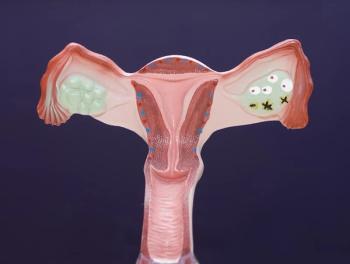
Miami Breast Cancer Conference® Abstracts Supplement
- 40th Annual Miami Breast Cancer Conference® - Abstracts
- Volume 37
- Issue suppl 4
- Pages: 13-14
8 Datopotamab Deruxtecan (Dato-DXd) in Advanced Triple- Negative Breast Cancer (TNBC): Updated Results From the Phase 1 TROPION-PanTumor01 Study
Background
Effective treatment options are limited for patients with advanced or metastatic TNBC who have progressed or are refractory to standard treatments. TROP2 is highly expressed in various tumor types, including breast cancer, and high membrane expression levels may be a marker of poor prognosis in patients with breast cancer. Datopotamab deruxtecan (Dato-DXd) is an antibody-drug conjugate (ADC) consisting of a humanized anti-TROP2 IgG1 monoclonal antibody covalently linked to a highly potent topoisomerase I inhibitor payload via a stable, tumor-selective, tetrapeptide-based cleavable linker. The phase 1 TROPION-PanTumor01 (NCT03401385) trial is evaluating the safety and efficacy of Dato-DXd in advanced/metastatic breast cancer, NSCLC, and other tumor types:
- Based on clinical results and exposure-response analyses, 6 mg/kg was selected for expansion across the clinical development program with ongoing trials including:
- Phase 1b TROPION-Lung02 and phase 3 TROPION-Lung01, TROPION-Lung07, TROPION-Lung08, and AVANZAR trials in NSCLC.
- Phase 3 TROPION-Breast01, TROPION-Breast02, and TROPION-Breast03 trials in breast cancer.
- Phase 1/2 TROPION-PanTumor02 trials in solid tumors including TNBC.
Here we present the updated results for patients with advanced TNBC (data cutoff: July 22, 2022).
Materials and Methods
TROPION-PanTumor01 (NCT03401385) is a phase 1, multicenter, open-label, 2-part, dose-escalation and -expansion study evaluating Dato-DXd in previously treated patients with solid tumors. The primary objectives were safety and tolerability. Tumor responses, including ORR (CR+ PR) and DCR (CR + PR + SD), were assessed by BICR per RECIST version 1.1.
Results
As of the July 22, 2022, data cutoff, 44 patients had received Dato-DXd and 3 patients had treatment ongoing (median study duration, 19.3 months [range, 15-25 months]); the primary cause of treatment discontinuation was disease progression (86%, including PD or clinical progression)
- Patients were heavily pretreated, with a median of 3 prior regimens (range, 1-10) in the advanced setting.
All-cause TEAEs were observed in 100% (any grade) and 52% (grade ≥3) of patients:
- The most common TEAEs (any grade, grade ≥3) were stomatitis (73%, 11%, respectively), nausea (66%, 2%), and vomiting (39%, 5%).
- Of the 16 patients (36%) who experienced alopecia, 23% had grade 1 and 14% had grade 2.
- One patient experienced grade 3 decreased neutrophil count.
- No cases of ILD, febrile neutropenia, or grade ≥3 diarrhea were reported.
- No treatment-related deaths were observed.
Antitumor responses were observed in the majority of patients, with an ORR of 32% in all patients and 44% in patients who were treatment-naive to Topo I inhibitor–based ADC therapies and had measurable disease at baseline:
- A median DOR of 16.8 months in each patient group and a median survival of 13.5 months in all treated patients and 14.3 months in Topo I inhibitor–naive patients were observed.
Conclusions
Dato-DXd demonstrated encouraging and durable antitumor activity and a manageable safety profile in heavily pretreated pts with metastatic TNBC. The phase 3 randomized TROPION-Breast02 (NCT05374512) trial of Dato-DXd vs chemotherapy as 1L therapy for pts with metastatic TNBC is ongoing.
AFFILIATIONS:
Aditya Bardia,1 Ian E. Krop,2 Funda Meric-Bernstam,3 Anthony W. Tolcher,4,5,6 Toru Mukohara,7 Aaron Lisberg,8 Toshio Shimizu,9 Erika P. Hamilton,10,11 Alexander I. Spira,12 Takahiro Kogawa13
1Massachusetts General Hospital Cancer Center, Department of Medicine, Harvard Medical School, Boston, MA.
2Yale Cancer Center, New Haven, CT.
3The University of Texas MD Anderson Cancer Center, Houston, TX.
4South Texas Accelerated Research Therapeutics, San Antonio, TX.
5NEXT Oncology, San Antonio, TX
6Texas Oncology, San Antonio, TX.
7National Cancer Center Hospital East, Kashiwa, Japan.
8Department of Medicine, David Geffen School of Medicine at the University of California, Los Angeles, Los Angeles, CA.
9National Cancer Center Hospital, Tokyo, Japan.
10Sarah Cannon Research Institute, Nashville, TN.
11Tennessee Oncology, PLLC, Nashville, TN.
12Virginia Cancer Specialists (VCS) Research Institute, Fairfax, VA.
13Department of Advanced Medical Development, Cancer Institute Hospital of JFCR, Tokyo, Japan.
Articles in this issue
Newsletter
Stay up to date on recent advances in the multidisciplinary approach to cancer.




































